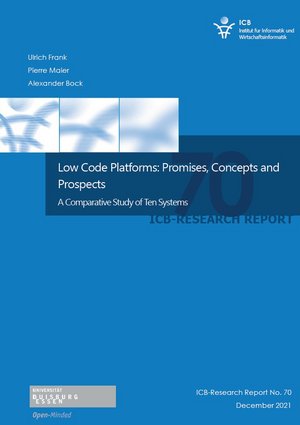Publikationen

Mit unseren Publikationen decken wir die unterschiedlichsten Forschungsbereiche ab, die sich im Feld von Mensch, Aufgabe und Technik ergeben. Neben traditionellen Themen der Wirtschaftsinformatik wie Wissensmanagement und Geschäftsprozessmanagement, finden Sie dabei auch Beiträge zu aktuellen Themen wie Blended Learning, Cloud Computing oder Smart Grids. Nutzen Sie diesen Überblick, um sich einen Eindruck über die Bandbreite und Möglichkeiten der Forschung der Wirtschaftsinformatik am Standort Essen zu verschaffen.

Art der Publikation: Forschungsbericht
Low Code Platforms: Promises, Concepts and Prospects: A Comparative Study of Ten Systems - ICB Research Report
- Autor(en):
- Frank, Ulrich; Maier, Pierre; Bock, Alexander
- Nummer des Berichts oder Beitrags:
- 70
- Ort(e):
- Essen
- Veröffentlichung:
- 2021
- Digital Object Identifier (DOI):
- doi:10.17185/duepublico/75244
- Volltext:
- <a href="/fileadmin/fileupload/WI-UMO/ICB_Report_70.pdf" class="pdf">Low Code Platforms: Promises, Concepts and Prospects: A Comparative Study of Ten Systems (21 MB)</a>
- Link zum Volltext:
- https://duepublico2.uni-due.de/servlets/MCRFileNodeServlet/duepublico_derivate_00074985/ICB_Report_70.pdf
- Zitation:
- Download BibTeX
Kurzfassung
In recent years, the catchword “low‐code” has evolved into what can be seen as a major trend
in software development platforms. A growing number of vendors respond to this trend by
offering software development platforms that promise limited need for coding only and a tremendous
boost in productivity. Both aspects have been the subject of intensive research over
many years in areas such as domain‐specific modeling languages, model‐driven software development,
or generative programming. Therefore, the obvious question is how ʺlow codeʺ
platforms differ from such approaches and what specific performance features they offer.
Since there is no unified definition of “low‐code”, the only way to develop an elaborate understanding
of what it is – and might be – is to analyze the actual use of the term. For obvious
reasons, it is not promising in this respect to rely on marketing announcements made by vendors.
Instead, it seems more appropriate to examine “low‐code” platforms. This research report
presents a study of 10 relevant platforms, capturing and assessing common characteristics
as well as specific features of individual tools. The study is guided by a method that consists
of a conceptual framework, which provides a uniform structure to describe and compare “lowcode”
platforms, and a process model that describes the sequence of steps.
